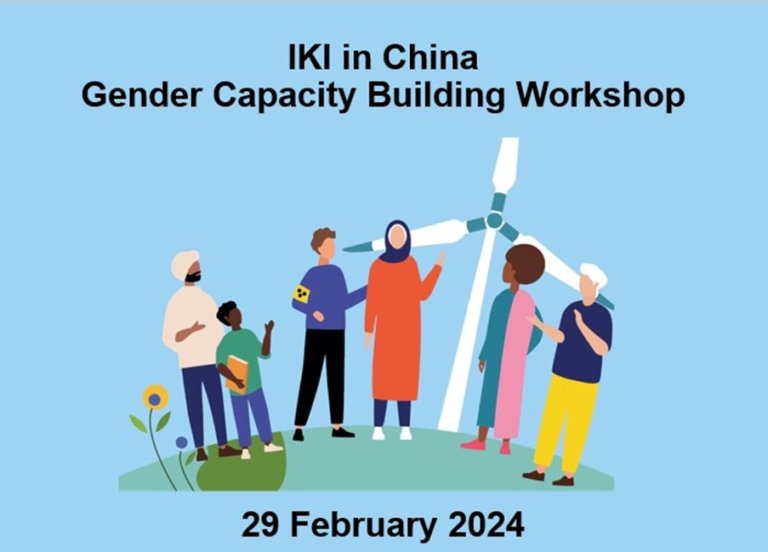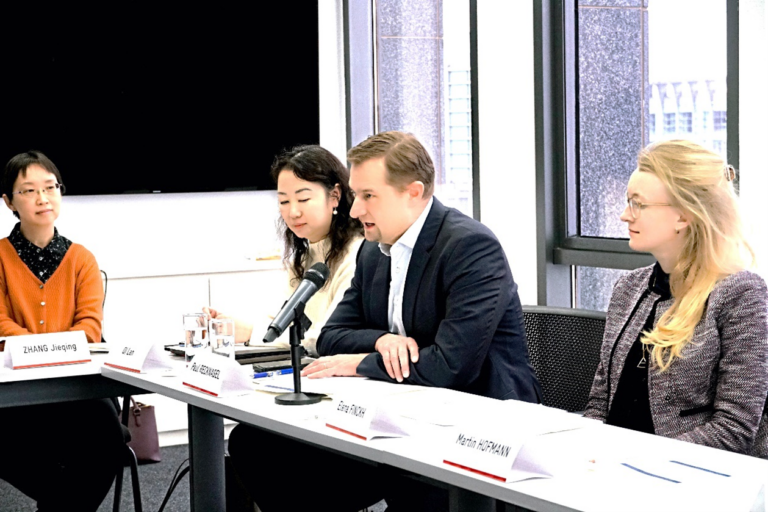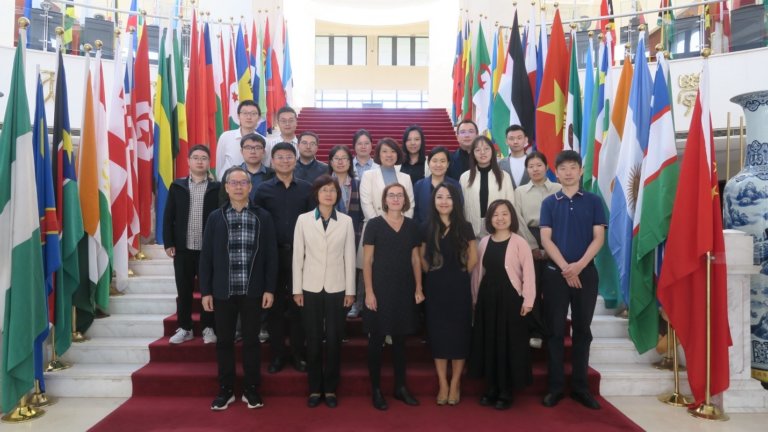In order to enhance exchange on the issue of climate legislation between China and Germany, Dr Stephan Sina, Senior Fellow at Ecologic Institute, visited Beijing from 20 to 21 September 2023 with the support of the NDC-Implementation project. Deutsche Gesellschaft für Internationale Zusammenarbeit (GIZ) and China’s National Centre for Climate Change Strategy and International Cooperation (NCSC) jointly invited him to participate in events at the NCSC, the Beijing Municipal Climate Change Management Centre, and Beihang University. More than 100 representatives from ten different departments and schools attended the exchange.
Workshop on Climate Legislation in China and Germany
The workshop on climate legislation in China and Germany was co-organized by GIZ and NCSC on the morning of 20 September 2023 at the NCSC in Beijing, and was moderated by Ms Tian Danyu, Deputy Director of the NCSC Strategic Planning Department. Ms Xing Baiying, Deputy Division Head of General Affairs at the Department of Climate Change of the Ministry of Ecology and Environment of the People’s Republic of China (MEE) and Ms Elena Finckh, Second Secretary of the Economic Department at the Embassy of the Federal Republic of Germany in Beijing, both attended the workshop and warmly welcomed the participants.

Ms Xing Baiying emphasized the importance and urgency of enacting a specialized climate law in China. According to her, Germany, as a civil law representative, is at the forefront of the world in terms of climate legislation experience and can thus serve as a suitable reference point for China’s legislative efforts. Ms Elena Finckh stated that legislation is vital in driving stakeholder action. Establishing framework conditions helps stakeholders determine the path of addressing climate change.
Subsequently, the attending experts delivered presentations. Ms Li Yumei, Associate Professor of Law at China Agricultural University introduced the aspect of agricultural carbon credit trading under the dual carbon target, taking the Tea Carbon Credit Trading in Meitan, Guizhou province, as an example. Ms Yue Xiaohua, Assistant Researcher at the Ecological Law Research Office of the Chinese Academy of Social Sciences (CASS), suggested improving the rules provided by the legal system for green certificates by researching China’s Green Certificate System.
Dr Sina analysed the characteristics and historical process of the German Federal Climate Change Act (KSG), outlining Germany’s successful experience, best practices, and challenges. He pointed out that the German KSG needs to adapt to new EU legislation and Germany also faces implementation challenges, including a lack of ambition of climate action programmes, the complexity of implementing legislation and measures, limited capacities of administrations and craftspeople, and the risk of lock-in effects of measures to combat the energy crisis resulting from the Ukraine war.
Ms Luo Yanni, Assistant Researcher at the College of Humanities and Law at Beijing University of Chemical Technology, gave a detailed introduction to the climate lawsuits situation in China. Finally, Professor Hou Jiaru, Director of the Institute for Green Development Strategy at China University of Political Science and Law and an expert on climate legislation in China, expanded on the necessity and urgency of climate legislation, also commenting on climate lawsuits.
Exchange of Experiences on Local Climate Change Legislation
In the afternoon of 20 September, Dr Sina, the GIZ team, and the NCSC team arrived at Beijing Municipal Climate Change Management Centre to exchange Chinese and German experiences on local climate change legislation with the Beijing Municipal Bureau of Ecology and Environment and Beijing Municipal Climate Change Management Centre. Mr Jia Qiumiao, Deputy Director of Beijing Municipal Climate Change Management Centre, demonstrated the success of low-carbon development in Beijing and shared the main approaches and results in six aspects.
Dr Sina introduced German climate acts at the sub-national (state) level, as well as their relationship to the federal climate change acts. He reiterated that all current acts are basically framework laws with quantified mitigation targets and general provisions to achieve them. After the presentations, participants had an in-depth discussion about supervision mechanisms, enterprise obligations setting, and carbon accounting issues.
Exchange at Beihang University
On 21 September, Dr Sina, the GIZ team, and the NCSC team met with Beihang University professors and students to discuss German climate protection legislation research. This workshop was co-organized by GIZ, NCSC, Beihang University Law School, Beihang University Center for German Studies, and the Carbon Governance and Climate Change Law Professional Committee of the China Law Association on Science and Technology.
Professor Du Qun of Beihang University Law School moderated the workshop. Ms Lu Na, Project Manager at GIZ East Asia, held an opening speech introducing the progress of the climate legislation work package under the NDC Implementation project. Dr Sina delivered a keynote speech addressing the framework of climate legislation at the German national level. Mr Wang Ziqi, Research Assistant at NCSC, and Mr Sun Jing, Doctoral Candidate at Beihang University Law School, presented research on a comparative study on the funding mechanisms for climate change responses in China and the US, and Germany’s measures for phasing out coal respectively. In the afternoon, Professor Pan Weijiang, Vice Dean at Beihang University Law School, unveiled its institutional and functional positioning, main business, and activities against the background of China’s dual carbon goals. In the end, he also warmly invited Dr Sina to have more frequent academic exchange with his university.

During the two-day visit, Dr Sina shared his profound insights with Chinese experts, scholars, and students in the field of climate legislation. This visit enables a better mutual understanding of climate legislation in both Germany and China and provides valuable information on promoting climate legislation in China through decarbonisation pathway design.



